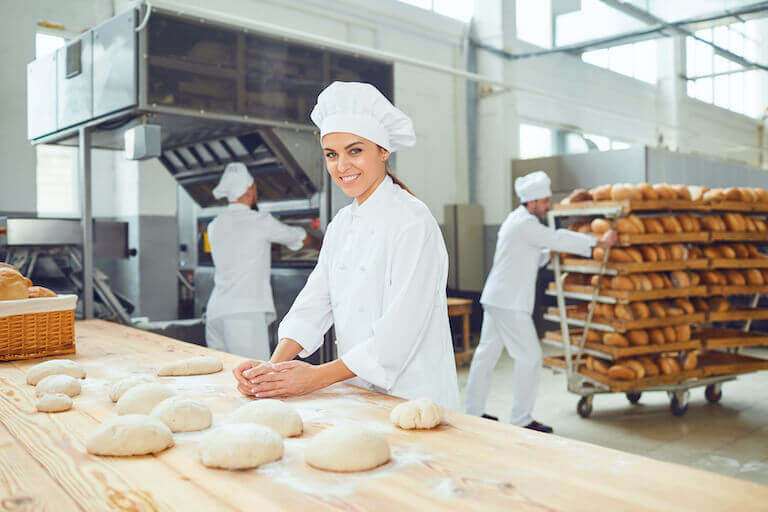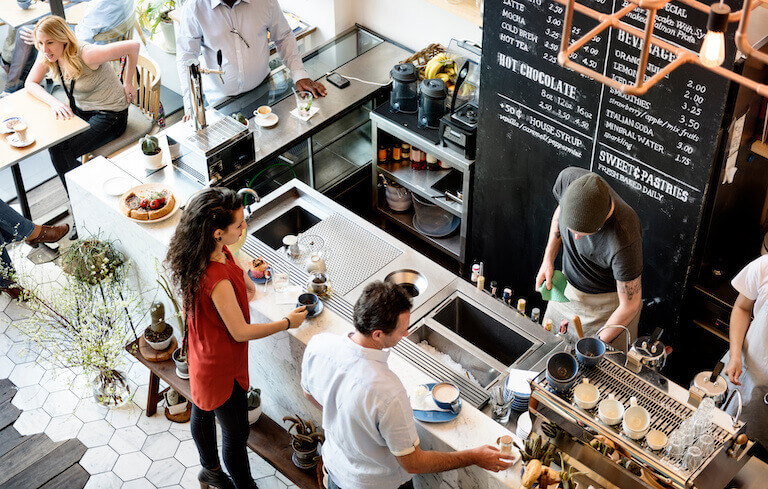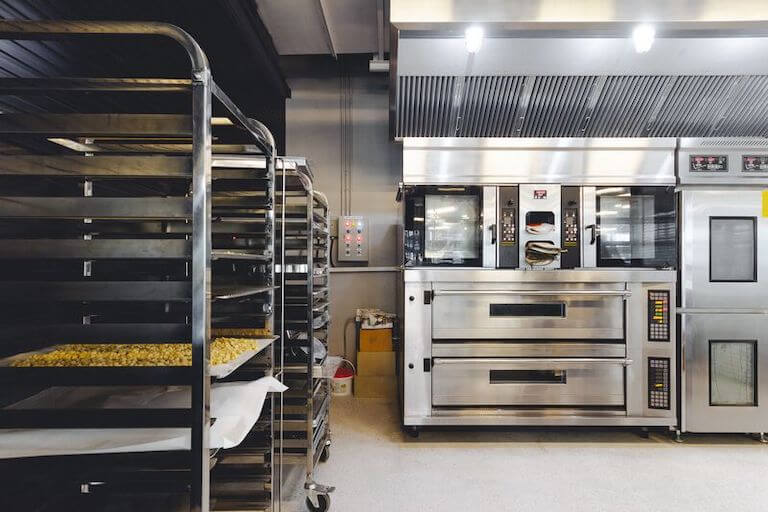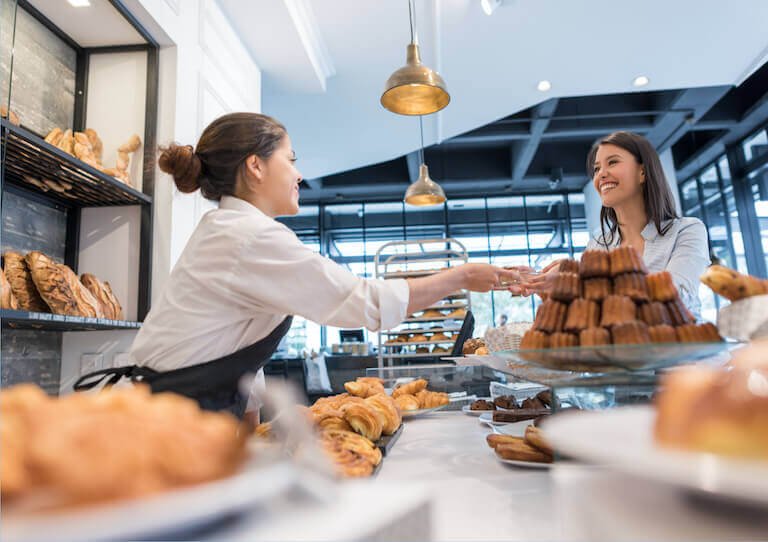Listen to This Article:
Owning your own bakery may seem like a dream come true—but what if you could make it even better?
Imagine having a thriving business that brings joy to your customers and allows you to live the life you’ve always wanted. Scaling your bakery business could be the key to making that dream a reality.
But how do you scale your bakery without sacrificing quality or customer satisfaction? And how do you ensure you can grow your business without running yourself into the ground?
In this guide, you can discover possible strategies for scaling your bakery business profitably and sustainably. We’ll cover everything from determining your goals to distribution channels and keeping expenses in check.
So, are you ready to scale your bakery business? Let’s get started!
The Difference Between Scaling & Growing a Business
Although becoming a baker and owning a bakery may have been your original goal, now you may be more focused on how to handle business growth. At first, the concept seems simple—sell more baked goods and make more money. But if you head down that path, you’ll quickly learn there is only so much you can do on your own. You’re only one person with limited time each day. So, how are you supposed to grow your bakery business?

Creating a sustainable plan for your bakery can make the difference between successfully scaling or burning out while trying to grow.
The first step is understanding that while the terms “scale” and “grow” are often used interchangeably, they’re not quite the same.
Scaling a business is sustainable long-term because it leads to increasing your revenue without increasing your expenses at the same rate. This allows you to maximize your profits and handle growth efficiently. Traditional growth, on the other hand, tends to look like selling more baked goods, hiring more staff, and increasing your overhead, potentially making it unsustainable long-term. Scaling, however, introduces new strategies, such as improving your process and equipment or finding new distribution channels to reach more customers without straining your resources.
| Growing Your Business | Scaling Your Business | |
|---|---|---|
| Definition | Hiring more staff or adding more equipment to boost revenue. | Using strategic investments, technology, and improving efficiency to increase revenue faster than costs. |
| Focus | Linear growth focused on adding resources proportionally to production. | Significantly increasing production without increasing resources at the same rate. |
| Investment | Increased physical resources and manpower spent upfront. | Adding technology, systems, and processes to improve efficiency. |
| Revenue | Increases similarly to the same rate as expenses. | Increases faster than costs. |
| Profit Margin | Remains constant or may decrease | Increases with revenue while costs remain the same or grow minimally |
| Scalability | Limited by staff, equipment, and space. | Allows growth beyond staff and physical limitations. |
Now that we’ve broken down the difference on paper between growing and scaling, let’s look at how the difference plays out in a hypothetical example:***
| Growing Your Bakery | Scaling Your Bakery | |
|---|---|---|
| Scenario | You decide to hire additional employees and expand into supplying products for local restaurants. | You decide to introduce new efficiencies into the bakery, allowing you to fulfill more orders. |
| Example | You hire two new bakers and secure contracts with five local restaurants. | You invest in a more efficient oven and streamline your baking process, enabling you to secure contracts with ten local restaurants. |
| Increased Monthly Revenue | $5,000 (from new contracts) | $10,000 (from new contracts) |
| Increased Labor Cost | $3,000 (salaries for new employees) | $1,000 (part-time staff or overtime) |
| Additional Ingredient Expenses | $1,500 | $2,000 |
| Investment in Efficiency | $0 | $2,000 |
| Net Profit | $500 | $5,000 |
As you can see, when you focus on scaling your bakery, your increased revenue far outpaces the increased expenses you have as a result of your changes. This is why it’s important to create a plan for scaling your bakery by looking at all options instead of focusing on the immediate gains you may be able to make from quickly hiring more staff.
In addition, it’s important to scale your bakery in a sustainable way. While you can always try to sell more baked goods and increase your net profit by baking from sunrise until sunset, you may eventually burn out. So, let’s get into the details of how to scale your bakery successfully.
Check out Escoffier Baking and Pastry Graduate Kevin Zurmuehlen’s bakery, L’Etoile Patisserie!
1. Is Your Bakery Even Ready to Expand?
It’s tempting to assume you’re ready to scale once your bakery is running well and you have a clientele who can’t seem to get enough of your treats, but assessing your readiness is essential before starting this exciting journey.
While scaling seems exciting, starting the process before your bakery is ready to expand can quickly lead to frustration. Ask yourself the following questions—and be honest with yourself about the answers.
- Does demand for your products exceed your supply? Regularly running out of product can be an indicator that it’s time to scale. Increasing your supply can meet the increased demand for your baked goods.
- Are you in a comfortable financial position? If you’re debt-free or can comfortably cover your existing debt obligations, you may be able to afford the initial expenses required to increase production. It’s essential to consider your ability to handle the additional costs before getting started.**
- Do you want to manage others and delegate tasks? Most scaling options involve bringing other people into your operation and the ability to delegate tasks. This is easier said than done for many entrepreneurs, so consider if you’re ready to let go of doing some things yourself.
If you and your bakery are ready to take the next step, you’ll need a recipe for success to guide you along the way.
**Auguste Escoffier School of Culinary Arts does not provide legal advice. Always consult with an attorney before creating a new business entity!
2. Determining How You Want to Scale
If you’ve assessed your bakery and it’s time to scale, your next step is determining how you want to grow your bakery business. There is no right or wrong choice on which direction you take. Here are a few popular options to consider.
Increase Production in a Sustainable Way
One of the simplest ways to scale is by increasing the production of your most popular items. If you constantly sell out of the lemon meringue pie halfway through the day, by increasing production, you can grow your sales without adding new products or services.
This strategy can allow you to meet the increased demand for your products with minimal risks. However, remember that simply increasing product can lead your business to grow but not scale. Consider adding new equipment and technology or improving processes to boost production without increasing expenses at the same rate. We’ll cover additional strategies that can help in the Keeping Expenses in Check section below.
Expand Your Menu
Consider tapping into emerging trends in baked goods or asking your current customers what other items they’d like to see in the bakery.
This strategy can help attract new customers while also giving your current customers something new and delicious to try. This can also be a fun way to tap into your creativity so work doesn’t grow stagnant with the same products daily.
Add New Distribution Channels
There are multiple ways to scale your bakery through new distribution channels, including the following.
Wholesale: Partner with restaurants, cafes, and grocery stores to distribute your baked goods to a wider audience. This leverages your established customer base and increases brand awareness.
Licensing: By licensing your recipes or branding to other bakers or food businesses, you can scale your business without scaling the production happening within your own bakery. This option allows you to capitalize on your intellectual property and reputation.
Subscription services: Adding a subscription box or monthly club to your bakery can help you scale through recurring revenue. Research has found subscription programs can increase how much customers spend and can help you create a predictable production schedule.
Online Sales: Whether you have a traditional or cottage bakery, building an e-commerce platform to sell directly to customers nationwide is a great option. You can expand outside your local area by offering convenient delivery options and highlighting unique products. Online marketplaces like Goldbelly allow artisanal bakers to sell their bread and pastries online rather than in-store.
Strategic partnerships: Similar to wholesale distribution, you can cross-promote products and services by partnering with other businesses, such as coffee shops or gift shops.

Forming a strategic partnership with local coffee shops and restaurants can be an effective way to scale your bakery business.
Catering: Scaling through catering can help you tap into a larger customer base and generate higher revenue per order. You can offer customized menus and delivery for local events, offices, and parties. It’s also an effective way to spread brand awareness and increase bakery sales.
Multiple Locations: Opening storefronts in new locations can help you cater to a larger local population. This could include multiple locations within your city or opening new locations in your surrounding area. You can also consider franchising opportunities if you have a strong brand model. Franchising can be a direct way to scale in which you expand the reach of your business while reaping additional financial benefits like associated fees.
3. Which Scaling Method Could Be Most Profitable?
As you explore options for scaling your bakery business, you’ll want to get down to the logistics. Dedicate time to research and planning so you can make informed decisions as you move forward. You can apply each of these concepts to any of the scaling methods above and compare your results to determine what may be the most profitable course of action.**
**Auguste Escoffier School of Culinary Arts does not provide legal advice. Always consult with an attorney before creating a new business entity!
Financial Analysis
Every option for scaling has a price tag. Conducting a financial analysis can help you assess the costs and potential return on investment for each strategy. If you want to add new equipment, you’d compare the costs of purchasing it and training employees to use it against the increased profits it could provide. If another approach or a different piece of equipment could get you that return on investment sooner or in greater abundance, you’d know to go with that instead. These head-to-head comparisons can help you determine which scaling path appeals to you most.
If you’re new to business numbers, you can try to teach yourself how to better analyze your financial statements, but you also shouldn’t be shy about speaking to an accountant.
Sales Forecasting
As you work to scale, you don’t want to make decisions based on guesses for your potential sales. Instead, you can gather numbers you already have and assess demand for your most popular products. You can use this information to develop sales forecast predictions—how much money you stand to make by expanding your offerings, either in your current market or in additional markets. The goal here is to use as much hard data as possible to make decisions about buying equipment and hiring new people.
For example, a donut shop may have two flavors that sell out hours before the rest. You can look at the rate of those sales hour-by-hour to determine how many more of those donuts you could sell if you had more in stock. Then, you’d compare that potential profit to the different ways you could meet that demand (more equipment, more personnel, better efficiencies, etc.).
Legal Compliance
Understanding the regulations and legal requirements, such as permits, tax structure changes, or local inspections needed for your chosen expansion strategy is crucial. Take time to research any new regulations or permits needed for your chosen path to scaling. Ensuring your bakery meets legal compliance from the start can help you avoid any unwanted issues later.
Market Research
You don’t want to choose your scaling strategy based solely on your own opinion. Market research helps you understand your target audience. Identifying what your customers prefer for products and services, gauging overall market demand, and analyzing competitor offerings can help you determine the best strategy to expand.
Imagine your bakery specializes in bread but gets a lunchtime rush from a nearby office park. Understanding that demographic, you might hire someone who can make spectacular cakes that you could offer to those offices at a discount (there’s no shortage of birthday cakes in any given office). By tapping into available markets, you can grow your bakery’s client base and reputation.

A cake baked by Escoffier Online Baking and Pastry Student Zaneta W.
Performance Tracking
Don’t just set a plan and forget about it. You want a system in place that can track your bakery’s performance regularly to measure revenue growth against your goals. This could include tracking sales, customer feedback, and operational efficiency. Tracking your progress and analyzing your performance allows you to make adjustments as necessary to stay on the right track.
The time you invest in thorough research and planning acts as a solid foundation for your bakery’s scalability. This “recipe for success” can help you make informed decisions and manage resources as you focus on your expansion goals.
**Auguste Escoffier School of Culinary Arts does not provide legal advice. Always consult with an attorney before creating a new business entity!
4. Keeping Expenses in Check
Remember, you’re only scaling if your revenue is increasing more than your expenses. This means that keeping expenses in check as your production increases is crucial. The following strategies can help you increase your net profits:
Optimizing Production
You might be able to lower your expenses by focusing on improving your current production process. Here are some ideas to get you started:
- Invest in Equipment: You may be able to improve your efficiency and baking capacity by upgrading your current equipment, like ovens, mixers, and cooking racks.
- Automate repetitive tasks to save time and labor: Reducing labor costs or increasing production without hiring additional help may be possible by adding automation to your process. Common automation tools in bakeries include dough dividers, rack loaders and unloaders, and fillers for icings and jams.
- Standardize Recipes: Look for ways to standardize your recipes to ensure consistency with your products and expenses. Consider pre-portioning ingredients to speed up the baking process.
- Utilize software: Find software to help you with your processes, from taking and fulfilling orders to tracking your inventory.

New kitchen equipment may help you optimize your production and lower expenses for your bakery business.
Reducing Per-Unit Costs
You’ll have to buy more supplies and ingredients as production increases. And very often, the more you buy, the less you pay per ounce or pound. Regularly reassess what you’re paying vendors for flour, sugar, chocolate, yeast, and other bulk ingredients to help ensure you get the best possible price.
You can also look outside the traditional “big box” food suppliers to nonprofits and local farmers. You might be surprised at the pricing. For example, the late, great bakery owner Andy Clark created a nonprofit grain mill called The Mill Site that supplies flour to local bakers at affordable prices.
The same concept applies to packaging, to-go cups, receipt paper, napkins, and all the other supplies you need to serve your customers. Remember, lowering expenses is a way to increase your net profits.
5. Building a Strong Team
You’ve probably heard the old adage, “Teamwork makes the dream work,” and while it may sound trite, building a strong team is important as your bakery scales. You are the bakery mastermind behind the delicious treats your customers love, but continuing to scale requires a skilled team working together. You’re limited on what you can do alone, but not everyone who wants to work at the bakery will be the perfect fit. When you find the right people, you can begin to delegate tasks and allow others to flourish in their roles.
Delegating tasks like baking, sales, or customer services allows you to step into a managerial role and focus on strategic areas like marketing, menu development, or exploring new distribution channels. The key is hiring individuals with skills that complement your own and those who share a passion for baking excellence. With a strong team supporting your efforts, you can continue to smoothly operate your bakery while you scale.

Hiring employees to work behind the counter can free up your time for tasks involved with running the business side of the bakery.
Here are strategies to keep in mind as you build your team.
Hire the Right Individuals
Not everyone will be a great fit for your bakery. Look for those experienced in the area you’re hiring for, whether it’s baking, sales, or accounting. Remember, you can’t expect one person to be proficient in all areas of the bakery, so know what skills you’re looking for when you begin the interview process. Also, check to see if they’ll fit in with the culture and feel of your bakery.
Training & Development
Create a training plan before you hire. Doing so will help ensure each hire understands the production process. Continuing to invest in training opportunities for your team can help foster loyalty. Don’t forget to continue developing your own skills as a baker, leader, and business owner.
Delegation & Trust
As you scale, it’s essential to learn how to delegate tasks. It’s important that you trust your employees to complete their work and aren’t constantly looking over their shoulders. This helps foster trust in the team and creates a collaborative work environment.
Having established and written processes and systems in place from the start can make a significant difference in the success of building your team, starting with your first hire.
6. Overcoming the Challenges of Scaling Your Bakery
There is good news and bad news when it comes to scaling your bakery. Let’s start with the bad news: while scaling and increased demand may seem like a great problem to have, it’s still a problem that can create overwhelming challenges for small bakeries.
You’ve likely heard of the television show “Cake Boss,” but you may not have heard about the challenges it brought to the bakery behind the show, Carlo’s Bakery. As the show gained popularity, the bakery grew by 1,000%. They struggled to keep up with orders until they upgraded their processes and began using software to help.
So, here’s the good news: yes, increased demand comes with challenges, but there are many solutions available to help you overcome those challenges and continue scaling a thriving bakery.
Some of the challenges that come with increased demand can include the following.
Capacity Limits
You may find that demand begins to outpace the ability of your equipment to keep up. When this happens, consider investing in additional equipment or new efficiencies to help you meet demand.
Long Lines or Wait Times
Good customer service is key to any business, so you don’t want your customers to experience long wait times. As demand increases, consider using online ordering systems or adding an express line for those with small purchases.
Cash Flow Management
A common challenge among growing businesses is the need for capital upfront. You may need additional capital to hire staff, purchase new equipment, or keep up with increased ingredient costs before making additional sales. Look into obtaining a small business loan to help you bridge the gap as you scale.**
**Auguste Escoffier School of Culinary Arts does not provide legal advice. Always consult with an attorney before creating a new business entity!
Managing Inventory
Forecasting and ordering must be improved so you don’t run out of key ingredients or need to toss expired perishables. As your production continues to increase, software may become necessary to help you keep track of how much you’re using so you can order correctly.
Maintaining Quality Control
With increased demand, maintaining consistent quality can become more challenging. To combat this, have systems and processes in place and documented so everyone can complete tasks the same way. This can help ensure your customers receive the same high-quality, delicious baked goods regardless of which employees are working.

Cupcakes baked by Escoffier Online Baking and Pastry Student Zhana G.
Scale Your Knowledge & Your Bakery
Your bakery is a success, and you’re ready for more. While scaling up can feel intimidating, it can be a sweet success with the right recipe and following the steps above!
This guide offered you some key ingredients: assessing your readiness, exploring expansion options, growing a team, and keeping costs in check. But succeeding at scaling your bakery business isn’t only about the business. Continuing to develop your skills and knowledge, both as a baker and business owner, can make all the difference.
Invest in yourself and your bakery. For example, you can take classes to improve your baking and business skills. You can enroll in an online baking and pastry program that can help you fit classes into your busy schedule as a bakery owner. Read books and articles about how to run a business efficiently. Network with other local business owners to learn from their experiences and share your own.
If you want guidance on learning to grow your bakery business, learn how our Food Entrepreneurship Program could help you take your bakery to the next level.
You’ve done the hard work of getting a bakery up and running, now you can take it to the next level and continue sharing your passion with others.
TO LEARN MORE ABOUT STARTING A FOOD BUSINESS, TRY THESE ARTICLES NEXT:
- How to Open a Bakery: 6 Steps to Success
- How to Start a Bakery Business From Home
- How to Start a Food Truck
This article was originally published on August 20, 2021, and has since been updated.


